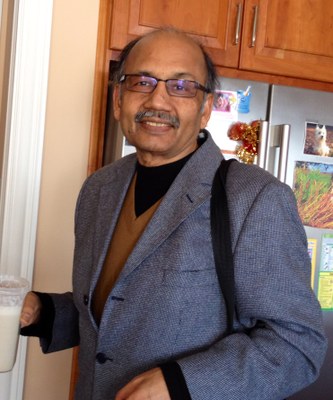Ramesh C Gupta, Ph.D.
Education:
B.S., Agra University, Agra, India, 1967
M.S., Meerut University, Meerut, India, 1969
Ph.D., Roorkee University (now named Indian Institute of Technology), Roorkee, India 1972
Postdoctoral training, Baylor College of Medicine, Houston, Texas, 1973
Curriculum Vitae
Current Positions:
Professor (Tenure), Department of Pharmacology and Toxicology, University of Louisville School of Medicine
Agnes Brown Duggan Chair in Oncological Research, Brown Cancer Center, University of Louisville
Contact Information:
Delia Baxter Research Building, Room 304E
University of Louisville
580 S. Preston St.
Louisville, KY 40202, USA
Phone 502-852-3684
Fax 502-852-3842
Email: rcgupta@louisville.edu
Website:
http://louisville.edu/medicine/departments/pharmacology/faculty/primary/gupta
Research Description:
Dr. Gupta has always worked at the cutting edge technology pioneering sensitive methods to sequence tRNAs, followed by ultrasensitive 32P-postlabeling to measure DNA damage by environmental carcinogens. This assay has been used worldwide and still remains the most sensitive technology. His laboratory has applied this technology in cell culture and rodents exposed to a variety of carcinogens, and complex mixture such as cigarette smoke, and to tissues from cigarette smokers. These works have received several thousand citations.
Recently, his laboratory reported the development of novel polymeric implants for continuously (“24/7”) systemic and local delivery of natural compounds for long durations for prevention and treatment of cancer. This technology has fetched several patents from the US and international bodies. His laboratory is presently developing means for oral delivery of small drug molecules and siRNAs by nanoparticles.
His laboratory’s recent focus has been to identify natural compounds and extracts which attack multiple targets for prevention of lung, breast, cervical and ovarian cancers. His laboratory was the first to report the inhibition of breast cancer and lung cancer by blueberry ‘colored’ compounds, and cervical cancer by withaferin A isolated from the ‘Ayurvedic’ herb ashwagandha. The blueberry compounds have also elicited enhanced response of chemotherapeutic drugs which led to a lung cancer clinical trial.
The laboratory’s current thrust is to develop simple and effective strategies for prevention and treatment of cancer recurrence and metastasis using blueberry bioactives and other natural compounds and novel drug delivery systems, and apply these strategies in clinical trials. He has been fortunate to have a qualified team of researchers with background in Chemistry, Biochemistry, Phytochemistry, Pharmaceutical Sciences, and Molecular Biology, continuous funding from the NIH, KY State and DoD grants, the Duggan Endowment and Brown Cancer Center.
Literature Cited:
- Arif, JM, Dresler, C, Clapper, M, Gairola CG, Srinivasan, C, Lubet, RA & Gupta RC. Lung DNA adducts detected in human smokers are unrelated to typical polyaromatic carcinogens Chemical Research Toxicology 19: 295-299, 2006. PMID: 16485906
- Sibele Meireles S, Esteves G, Hirata, Jr. R, Peri S, Devarajan K, Slifker M, Mosier S, Peng J, Vadhanam M, Hurst H, Neves EJ, Reis L, Gairola CG, Gupta RC & Clapper M. Early Changes in Gene Expression Induced by Tobacco Smoke: Evidence for the Importance of Estrogen within Lung Tissue. Cancer Prev Res. 3: 707-717, 2010.PMCID: PMC2896420.
- Bansal SS, Goel M, Aqil F, Vadhanam M & Gupta RC. Advanced Drug-Delivery systems of Curcumin for Cancer Chemoprevention. Cancer Prev Res. 4: 1158-1171, 2011. PMCID: PMC3151314
- Munagala R, Kausar H & Gupta RC. Withaferin A induces p53-dependent apoptosis by repression of HPV oncogenes and up-regulation of tumor suppressor proteins in human cervical cancer cells.Carcinogenesis, 32: 1697-1705, 2011. PMID: 21859835
- Aqil F, Gupta A, Munagala R, Jeyabalan J, Kausar H, Sharma RJ, Singh IP & Gupta RC. Antioxidant and antiproliferative potential of anthocyanin/ellagitannin-enriched extracts from Syzygium cumini L. (‘jamun’, the Indian Blackberry). Nutr Cancer., 64: 428-438, 2012. PMCID: PMC3351850.
- Kausar H, Jeyabalan J, Aqil F, Chabba D, Sidana J, Singh, IP & Gupta RC. Berry anthocyanidins synergistically suppresses growth and metastatic potential of human non-small-cell lung cancer cells. Cancer Letters, 325: 54-62, 2012. PMID: 22659736
- Gupta R, Bansal S, Aqil F, Jeyabalan J, Cao P, Russel GK, Munagala R, Ravoori S, and Vadhanam MV. Controlled-release systemic delivery - a new concept in cancer chemoprevention. Carcinogenesis, 33: 1608-15, 2012. PMCID: PMC3499062.
- Spencer W, Vadhanam MV, Jeyabalan J & Gupta RC. Oxidative DNA damage following microsome/Cu(II)-mediated activation of the estrogens, 17β-estradiol, equilenin, and equilin: role of reactive oxygen species. Chem. Res. Tox., 25: 305-314, 2012. PMID: 22126130
- Kausar H, Munagala R, Bansal S, Aqil F, Vadhanam MV & Gupta RC. Cucurbitacin B potently suppresses non-small-cell lung cancer growth: Identification of intracellular thiols as critical targets. Cancer Letters. 332:35-45, 2013, Epub, PMID: 23340170
- Munagala R, Aqil F, Vadhanam MV & Gupta, RC. MicroRNA 'signature' during estrogen-mediated mammary carcinogenesis and its reversal by ellagic acid intervention. Cancer Letters, 339: 175-184, 2013. PMCID: PMC3775863
- Bansal SS, Kausar H, Vadhanam MV, Ravoori S, Rai SN & Gupta RC. Curcumin Implants, not Curcumin Diet Inhibits Estrogen Induced Mammary Carcinogenesis in ACI Rats. Cancer Prevention Res, 7:456-465, 2014. PMCID: 24501322
- Aqil, F, Vadhanam, M, Jeyabalan J, Singh, IP & Gupta RC. A sensitive method for the detection of anthocyanins/anthocyanidins in animal tissues. J Agric Food Chem, 62: 3912-3918, 2014. PMID: 24650213.
- Jeyabalan J, Aqil F, Munagala R, Annamalai L, Vadhanam MV & Gupta RC. Chemopreventive and therapeutic activity of dietary blueberry against estrogen-mediated breast cancer. J Agric Food Chem. 62:3963-3971, 2014. PMID: 24245576.
- Aqil F, Jeyabalan J, Vadhanam MV, Lehmler H, Robertson LW & Gupta RC. DNA adducts and effects on cellular markers by sustained release of PCB126 and PCB153 by polymeric implants. Toxicology Reports, In press, 2014. PMC4266188
- Munagala R, Aqil F, Jeyabalan J & Gupta RC. Tanshinone IIA inhibits viral gene expression leading to apoptosis and inhibition of cervical cancer. Cancer Letters, In press, 2014. PMID: 25304375
 Facebook
Facebook Twitter
Twitter Linkedin
Linkedin